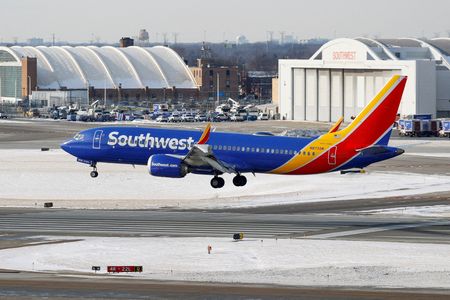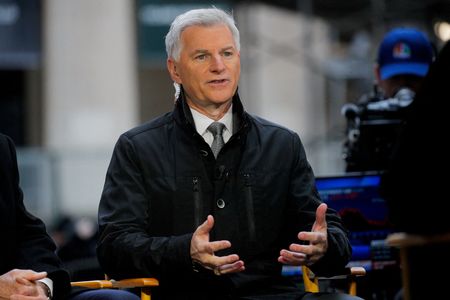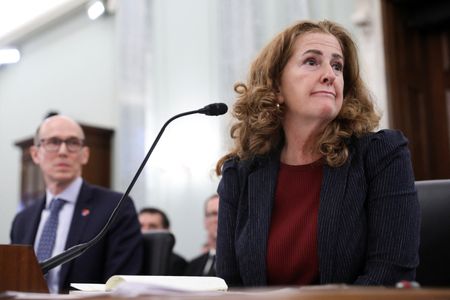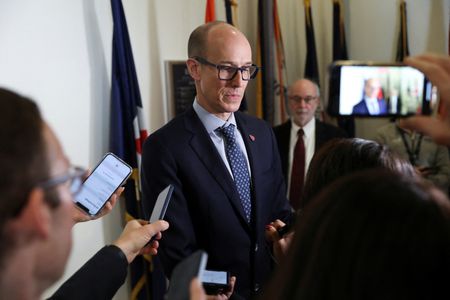By David Shepardson and Rajesh Kumar Singh
WASHINGTON (Reuters) -Southwest Airlines on Thursday faced harsh criticism from U.S. senators at a hearing investigating the airline’s meltdown that disrupted travel plans for 2 million customers, with one lawmaker calling the situation an “unmitigated disaster.”
Senators recounted to Southwest a litany of horrendous travel stories: People missing funerals and holiday gatherings, passengers forced to drive for 17 or more hours across the country after flights were canceled and cancer patients who could not get treatment.
The airline and its pilot union offered sharply contrasting reasons for the low-cost carrier’s massive travel disruptions. While Southwest cited weather impacts, the union singled out poor preparation and a failure to modernize technology.
Democratic Senator Jacky Rosen called it an “unmitigated disaster” that had a “devastating impact on families.”
Ted Cruz, the top Republican on the Senate Commerce Committee, called the cancellation of more than 16,000 flights “an epic screwup” but said he was confident Southwest executives “are committed to doing everything possible to prevent its recurrence.”
Southwest Chief Operating Officer Andrew Watterson told reporters that the airline has already paid hundreds of millions of dollars in compensation and reimbursements for expenses and will cut 2022 bonuses to executives when they are awarded in March.
“Executive bonuses for 2022 will be reduced because of this,” he said.
Watterson said it has received about 284,000 cases from passengers impacted by meltdown and reimbursed more than 273,000 — leaving 10,782. He said those still under review had been submitted more recently.
“We reimbursed tire chains, strollers, car seats, pet sitting, but things we didn’t reimburse were things like $7,000 shopping sprees at luxury stores or chartering a private jet,” Watterson said, adding that 96% of claims have been completed.
Watterson said that any passenger claim that was well documented and under $4,000 could be paid on the spot, while higher requests went to a supervisor.
He acknowledged that the airline made mistakes and that technology issues were a factor. He said the carrier is introducing an updated crew scheduling system on Friday to address a specific failure during the meltdown.
“Let me be clear: we messed up.” After detailing what went wrong, he added that “none of this is an excuse.” He admitted: “There were technology issues during the disruption — we don’t dispute that.”
Commerce Committee chair Maria Cantwell said, “We’re always going to have these weather events and some of us believe they’re going to become more severe. But what we want is to have a system that is ready to address that.”
Cantwell said Southwest Chief Executive Officer Bob Jordan, who had been invited to the hearing, “didn’t want to show up.” Southwest said the hearing conflicted with other commitments, including an employee rally in Baltimore on Wednesday.
The meltdown caused the cancellation of almost 17,000 flights and is estimated to have cost the airline more than $1 billion. It has also prompted a lawsuit from shareholders and a Department of Transportation investigation.
The Dallas-based airline attributed the breakdown in service to a “historic” winter storm, both in size and scale, that caused frozen jet bridges and icy aircraft engines.
But Southwest’s pilot union, which is in contract negotiations with the airline, blamed the company and its leadership for a “failure” to modernize crew management processes and technology and to prepare for the storm.
Casey Murray, president of the Southwest Airlines Pilots Association (SWAPA), said that the union has been sounding the alarm about the carrier’s crew scheduling technology and “outdated” operational processes for years.
“Unfortunately, those warnings were summarily ignored,” he said.
The debacle has put Jordan in the eye of a storm as he faces pressure to restore the airline’s credibility and regain the trust of customers just one year after he took the helm. Jordan has apologized and taken responsibility for the troubles, vowing to prevent a repeat.
Murray said that while Jordan inherited a “massive, complex operation held together by duct tape and baling wire,” he must show through actions that the company is serious about change.
(Reporting by Rajesh Kumar Singh and David Shepardson in Washington; Editing by Josie Kao and Mark Porter)





